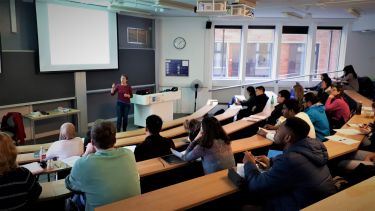The aim of the course is to outline the relevant principles and techniques, and to explore these technologies with the students. Participants generally have different levels of scientific knowledge and are from various faculties across the University. The course is listed as a Doctoral Development Programme module (BMS6007) and comprises lecture-style seminars on protein-protein interactions, post-translational modifications, and metabolomic and proteomic profiling, as well as three interactive sessions that intend to reinforce certain concepts, such as spectral interpretation, experimental workflows and a practical demonstration with a portable mass spectrometer.
Although open to all staff and students, this course is primarily aimed at postgraduate students, who are already using or are planning to utilise mass spectrometry as part of their research projects.
The course is led by Dr Mark Collins, who works together with Dr Adelina E Acosta Martin and Dr Heather Walker to ensure that the content is well-rounded and a coherent journey through the field of mass spectrometry with emphasis on its wide range of applications. This year's course description and schedule can be found here. We also highly value the experience of providing education, which is why this year, members of the Facility, Ms Lydia Kiesel and Dr Trong Khoa Pham had the opportunity to help deliver the
interactive session about experimental design.
At the end of each day to support the learning process and highlight the learning outcomes, there was a short assessment in the form of an ungraded quiz. This was a huge success and enjoyed by all parties involved. According to feedback we received after the course, it has had a huge impact on students’ skills and knowledge level concerning mass spectrometry. The feedback highlighted that the course and its content was very well organised and planned and the instructors were very helpful, approachable and showed a high degree of expertise. About the interactive session on mass spectra interpretation a participant stated that it was "very userful; I could not get my head round this from just reading papers, so it helped a lot to have someone explain it in detail. The exercises were very helpful too..."
[the interactive session on mass spectra interpretation was] very useful; I could not get my head round this from just reading papers, so it helped a lot to have someone explain it in detail. The exercises were helpful too…
Anonymous student attending the course
The aim of the course, namely to introduce students to mass spectrometry and its benefits and applications, has been achieved as 80% of participants have confirmed to have identified new methods to advance their projects or even come up with new project ideas.
It was a pleasure meeting everyone and to share our passion of mass spectrometry with you. We hope it was a positive experience for everyone involved and that it will be of use to you in your future careers. We are looking forward to our next mass spectrometry course in January 2021 and for a new group of students and staff to join us.



